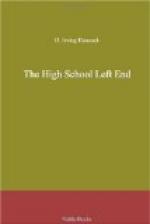“Good work!” the coach shouted, after sounding the whistle.” Ripley and Prescott, that was the right sort of team work.”
Again second essayed to get away with the ball. This time the forward pass was employed—–that is to say, attempted. Hudson and Purcell, by another clever feint, got the ball stopped and down; third time, and second lost the ball on downs.
Now School had the ball. As the quarter-back’s signals rang out there was perceptible activity and alertness at School’s right end. As the ball was snapped, School’s right wing went through the needful movements, but Dick Prescott, over at left end, had the ball. Ripley and Purcell were supporting him.
Straight into the opposing ranks went Ripley and Purcell, the rest of the school team supporting. It was team work again. Dick was halted, for an instant. Then, backed by his supporters, he dashed through the opposition—–on and on! Twice Dick was on the point of being tackled, but each time his interference carried him through. He was over second’s line—–touch-down, and the whistle sounded shrilly, just a second ahead of cheers from some hundred on-lookers.
As Dick came back he limped just a bit.
“I tell you, it takes nerve, and a lot of it, to play that game,” remarked one citizen admiringly.
“Nerve? pooh!” retorted his companion. “Just a hoodlum footrace, with some bumping, and then the whistle blows while a lot of boys are rolling over one another. The whistle always blows just at the point when there might be some use for nerve.”
The first speaker looked at his doubtful companion quizzically.
“Would it take any nerve for you,” he demanded, “to jump in where you knew there was a good chance of your being killed,”
“Yes; I suppose so,” admitted the kicker.
“Well, every season a score or two of football ball players are killed, or crippled for life.”
“But they’re not looking for it,” objected the kicker, “or they wouldn’t go in so swift and hard. Real nerve? I’d believe in that more if I ever heard of one of these nimble-jack racers taking a big chance with his life off the field, and where there was no crowd of wild galoots to look on and cheer!”
“Of course killing and maiming are not the real objects of the game,” pursued the first speaker. “Coaches and other good friends of the game are always hoping to discover some forms of rules that will make football safer. Yet I can’t help feeling that the present game, despite the occasional loss of life or injury to limb, puts enough of strong, fighting manhood into the players to make the game worth all it costs.”
“I want to see the nerve, and I want to see the game prove its worth,” insisted the kicker.
Second eleven, though made up of bright, husky boys, was having a hard time of it. Thrice coach arbitrarily advanced the ball for second, in order to give that team a better chance with High School eleven.




